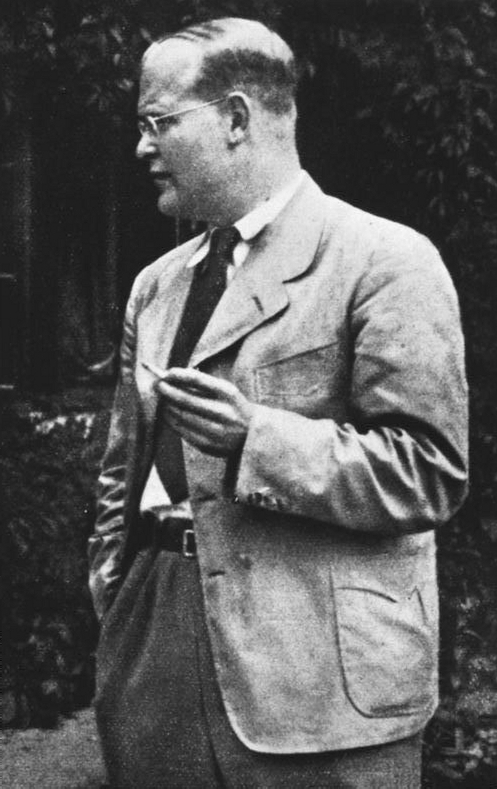Дитрих Бонхёффер знаменитые цитаты
Дитрих Бонхёффер Цитаты о мужчинах
„Пастор не должен жаловаться на приход не только другим людям, но и Богу“
«Жизнь в христианском общении», Гл.1
Дитрих Бонхёффер цитаты
„Церкви не нужны блестящие личности“
«Жизнь в христианском общении», Гл.4
„«Предательство», например, не есть правда, так же как фривольность, цинизм и т. п.“
«Письма другу», ноябрь 1943
„Человеческая любовь не очень высоко ценит истину“
«Жизнь в христианском общении», Гл.1
„«Бог» как рабочая гипотеза, как лазейка для выхода из затруднительных положений, стал ненужным“
«Письма другу», август 1944
„Лютерано-реформатские (частью и католические) противоречия уже не являются подлинными“
«Письма другу», август 1944
„Божья благодать быстро разрушает мечты“
«Жизнь в христианском общении», Гл.1
Дитрих Бонхёффер: Цитаты на английском языке
Letters and Papers from Prison (1967; 1997), The Friend
Источник: Letters and Papers from Prison (1967; 1997), Who Stands Fast?, p. 5.
translated as The Cost of Discipleship (1959), p. 51.
Discipleship (1937), Costly Grace
Источник: Discipleship (1937), Truthfulness, p. 138.
exegesis of Matthew 5:13, p. 118.
Discipleship (1937), The Visible Community
Attributed to Bonhoeffer on the internet, but this is from a remark about him, not by him, in Eric Metaxas, Bonhoeffer: Pastor, Martyr, Prophet, Spy http://books.google.com/books?id=aG0q3X8TVpsC&pg=PA486#v=onepage (2010), p. 486.
Misattributed
Источник: Discipleship (1937), The Beatitudes, p. 108.
Источник: Discipleship (1937), The Righteousness of Christ, p. 122.
Источник: Discipleship (1937), The Hidden Righteousness, p. 158.
Источник: Discipleship (1937), The Enemy, the "Extraordinary", p. 150.
Letters and Papers from Prison (1967; 1997), The Friend
Источник: Discipleship (1937), The Enemy, the "Extraordinary", pp. 147-148.
“Blessed are they that mourn, for they shall be comforted.”
With each beatitude the gulf is widened between the disciples and the people, their call to come forth from the people becomes increasingly manifest. By “mourning” Jesus, of course, means doing without what the world calls peace and prosperity: He means refusing to be in tune with the world or to accommodate oneself to its standards. Such men mourn for the world, for its guilt, its fate, and its fortune.
Источник: Discipleship (1937), The Beatitudes, p. 108.
Letters and Papers from Prison (1967; 1997), The Friend
Источник: Letters and Papers from Prison (1967; 1997), Are we still of any use?, p. 16
by seeking deliverance from self-will through service to the community. Calling and freedom were to him two sides of the same thing. But in this he misjudged the world; he did not realize that his submissiveness and self-sacrifice could be exploited for evil ends. When that happened, the exercise of the calling itself became questionable, and all the moral principles of the German were bound to totter. The fact could not be escaped that the Germans still lacked something fundamental: he could not see the need for free and responsible action, even in opposition to the task and his calling; in its place there appeared on the one hand an irresponsible lack of scruple, and on the other a self-tormenting punctiliousness that never led to action. Civil courage, in fact, can grow only out of the free responsibility of free men. Only now are the Germans beginning to discover the meaning of free responsibility. It depends on a God who demands responsible action in a bold venture of faith, and who promises forgiveness and consolation to the man who becomes a sinner in that venture.
Источник: Letters and Papers from Prison (1967; 1997), Civil Courage, p. 5
Источник: Meditations on the Cross (1996), Back to the Cross, p. 3
Источник: Discipleship (1937), Discipleship and the Cross, p. 88
Источник: Discipleship (1937), Revenge, p. 142
Источник: Discipleship (1937), Revenge, p. 142
Источник: Discipleship (1937), Revenge, p. 141
Источник: Discipleship (1937), Discipleship and the Cross, p. 87
Источник: Discipleship (1937), Discipleship and the Cross, p. 86
Источник: Discipleship (1937), Discipleship and the Cross, p. 85
Источник: Discipleship (1937), Discipleship and the Cross, p. 84
translated as The Cost of Discipleship (1959), p. 51
Discipleship (1937), Costly Grace
"Preface", as translated by Barbara Green and Reihhard Krauss (2001)
Discipleship (1937)
Источник: Costly Grace (1937), p. 49
Источник: Costly Grace (1937), p. 45
p 43
Costly Grace (1937)

